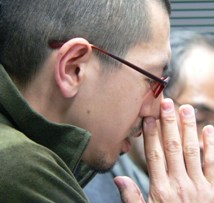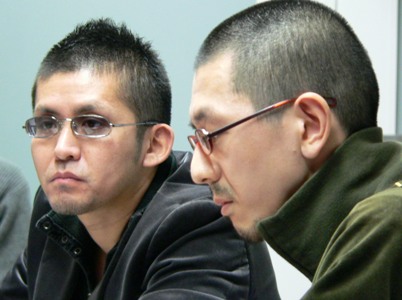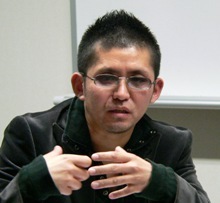Report : After Michel Foucault
After Deleuze, Heidegger, and Blanchot comes the turn of Foucault. Yasuo Kobayashi’s seminar “Times and the Unconscious”, already familiar to many, was held grandly, according to the expectations on the 20th of November.
Kazumi Takakuwa(Keio Gijuku University) and Toshihito Kayano (Tsuda Juku University) were invited as speakers. Both with Foucault-like hairstyle (if it is appropriate to use the expressions), Takakuwa’s calmness and Kayano’s heated speech were cooling out and heating up the small auditorium for 2 and a half hours.
A “missed encounter” was at the beginning. A missed encounter between Takakuwa and Foucault. It could be expected. When a young man was groping for the possibilities of a political reading of Bataille , amidst the Foucault fever of the late 1990, when notions or terms as episteme, panopticon, discipline were circulating loosely, he could not be satisfied with these somewhat empty names. But may be it was laso destiny. Takakuwa, who was working in the “niche production” from Bataille to Agamben, by chance encountered Foucault’s Dits et Ectirs, and thus met Foucault of the late 1970s. May some would dismiss it as a personal history, but it is worth the attention that this encounter was achieved through Agamben and through Foucault’s commitment to the Iran revolution. It was not Foucault, who studied the strata of language and knowledge, but Foucault, who was stepping into the entwinement of power and the body, that Takakuwa had encountered. At the pub, where the latter half of the match took place, Yasuo Kobayashi said: “ You can challenge me as much as you like as far as Foucault of Order of the Things is concerned, but at the time I did not want to read Foucault writing about security, territory, population”. Takakuwa, on the contrary, was interested in that side of Foucault, dealing with security, territory, population.

Here starts Kayano’s territory. Kayano using Foucault’s theory, setting a specific sound theory at the center presented Foucault’s theory of violence by linking it to his original theory of violence. A lot of people are acquainted with it already, so I will not enter into details. Another reason for not touching it is that on this occasion Kayano’s sharpness was not in his theory of violence. His question: “Have we really been reading Foucault?” sharply pierced the confidence of those of the audience, who considered themselves as familiar with Foucault to a certain extent. At least it looked that way. Not because it was an obvious remark on the necessity of serious reading. Who would predict such a seemingly modest admonition for thorough and scrupulous reading from someone who was using Foucault more freely than anybody? This unexpected attack must have been difficult to listen to from those who felt comfortable with Foucault. But otherwise, Foucault will disappear amidst words like authority or subject and “missed encounters” will repeat themselves.
(Kim Han, Exerpted Translation:Dennitza Gabrakova)








